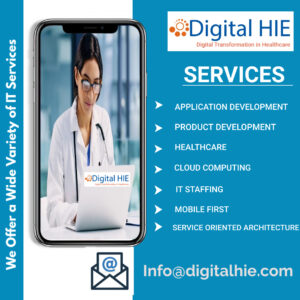- info@digitalhie.com
- Mon - Fri 8.00AM - 5.00 PM ET
4100 Lafayette Center Dr, Suite#204, Chantilly, VA 20151
4100 Lafayette Center Dr, Suite#204, Chantilly, VA 20151
Over 10 years we help companies reach their financial and branding goals. Engitech is a values-driven technology agency dedicated.
411 University St, Seattle, USA
engitech@oceanthemes.net
+1 -800-456-478-23
The Digital HIE team has rich experience in understanding your business needs and guiding you in the right direction regarding your Information Technology needs. It’s the minds who bring your product and services to life. Our team can bring the experience using reliable IT Tools and support to make your business successful. Digital HIE has been on a mission to change the face of IT by being a true, trusted partner for growing businesses. We do this by providing a blend of on-site, offshore, and remote-managed IT Services that put all of your IT needs under one umbrella. We protect you from IT challenges on a daily basis.

Electronic Health Records (EHR) is probably the most popular and the most crucial type of healthcare software. EHR systems store patients’ data: medical and family history, laboratory and other test results, prescribed medications history, and more. The most important EHR feature is that the patient’s health information can be created and managed by authorized providers, and then shared with other providers across more than one healthcare organization. This does not only automate and streamline the providers’ workflow, as they do not need to collect the same information all over again from the same patient, but they also visibly improve the patient’s care. EHRs reduce errors, improve patient safety, and support better patient outcomes.
Telemedicine, so online doctor consultations via web & mobile apps, had reached full demand during the 2020 pandemic when the usual healthcare chains were disturbed, and many people could not visit their doctors for regular face-to-face appointments. This demand proved to be a catalyst for a global digital healthcare revolution.Now, the need for telemedicine may have dropped from an all-time high, but this type of medical app has established its position in digital healthcare for good. Covid-19 broke down the main barrier for remote consultation providers, mainly: how to encourage doctors and patients to adopt that technology faster. More and more telemedicine apps and services appear on the market, and they offer a variety of features available within one platform: from in-app video conferencing, through file transfer (for patient’s test results), up to payment.
Remote patient monitoring (RPM) is able to collect patient data outside of healthcare institutions (clinics or hospitals), and in consequence, to gain more thorough information on the patient’s health, or even help conduct remote diagnosis based on that data. Remote patient monitoring software can also alert a doctor or a clinic if any abnormality is detected. Like telemedicine services, remote patient monitoring gained momentum during the pandemic when the old health management processes were disturbed.
Hospital management software provides both information and management capabilities to three stakeholder groups present at a hospital: the administration, doctors and authorized healthcare professionals, and patients.HMS often includes two separate portals, one with management-oriented features, and one portal available for patients. The management panel includes all administration and health information needed by the hospital – from food and medicine management, room booking and schedule, doctors’ timetables, and their scheduled appointments. But also completely mundane elements like laundry management, utility expenditures, water and power consumption, supplies inventory, etc.